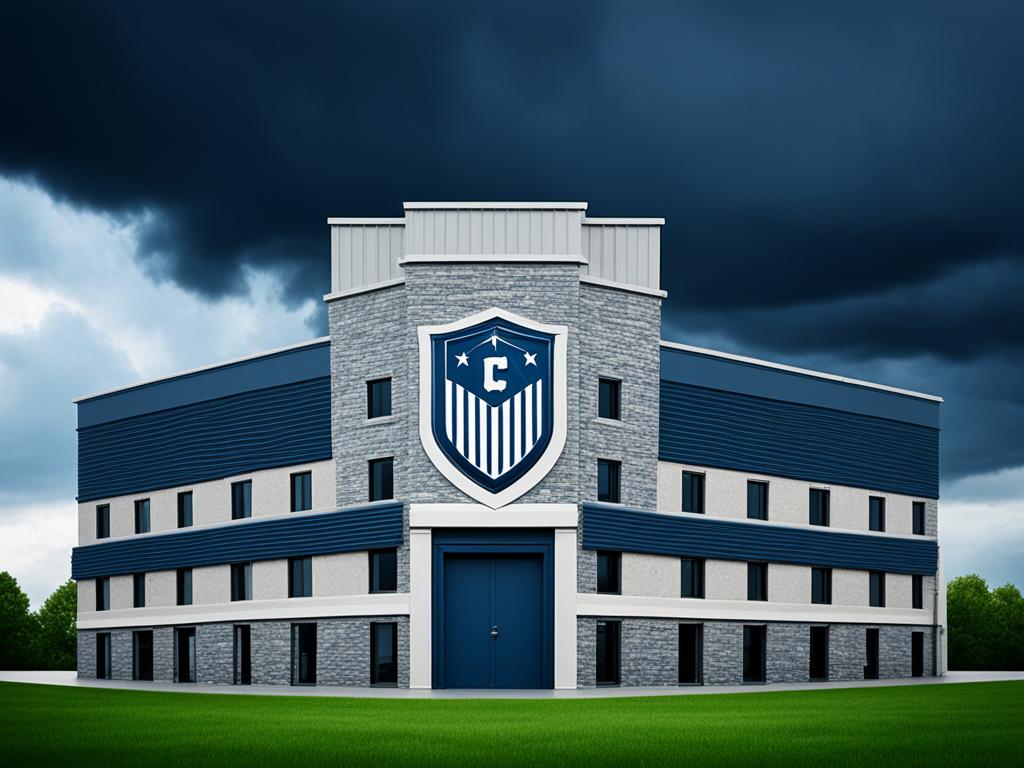Starting and running a business can be a big challenge. This is especially true when you think about the financial hits you might take from unexpected events.1 Commercial insurance steps in to help. It covers common losses like property damage and theft, liability issues, and employee injuries.1
Getting the right commercial insurance could keep your business standing after a big loss. Without it, a severe setback might close your doors for good. This makes commercial insurance a key investment for all businesses, no matter their size.1
Key Takeaways
- Commercial insurance provides essential protection against property damage, business interruption, theft, liability, and worker injury.
- Proper insurance coverage can mean the difference between business continuity and financial ruin after a major loss.
- Commercial insurance includes both property and casualty coverage, as well as specialized policies for specific risks.
- Working with a knowledgeable broker-agent is crucial to ensuring the right insurance plan for your business.
- Implementing effective risk management strategies can help prevent losses and minimize the impact of unexpected events.
Introduction to Commercial Insurance
Running a business is tough without the right protection. Commercial insurance steps in to protect companies from big losses. This happens when bad things like property damage, theft, or worker injuries occur.1 It’s a vital financial step for business success and survival.1
Importance of Commercial Insurance for Businesses
There are two big areas in commercial insurance: property and casualty. Property insurance helps if things are lost, stolen, or damaged. Casualty insurance deals with liability and worker injury claims.1 The right insurance can help a business survive a major hit. It lowers the risk of closing down or suffering a big financial hit.
Types of Commercial Insurance Coverage
Commercial insurance includes things like property, machinery, and worker protection.1 For instance, commercial property insurance covers buildings and business items. It usually also has measures to make sure you’re fully covered.1 Knowing what your policy covers is crucial for full protection.1
| Commercial Insurance Coverage Type | Key Features |
|---|---|
| Commercial Property Insurance | Covers buildings, business personal property, personal property of others1 |
| Inland Marine Insurance | Covers property in transit or at temporary locations, such as contractor’s equipment1 |
| Boiler and Machinery Insurance | Covers the repair or replacement of machinery and equipment damaged by mechanical or electrical breakdown1 |
| Crime Insurance | Covers losses from criminal acts such as theft, forgery, and employee dishonesty1 |
| Commercial Automobile Insurance | Covers company vehicles and drivers for accidents, injuries, and property damage2 |
| Commercial General Liability Insurance | Covers claims of bodily injury, property damage, and personal/advertising injury to third parties3 |
| Commercial Umbrella Insurance | Provides additional liability coverage beyond the limits of other policies2 |
| Workers’ Compensation Insurance | Covers medical expenses and lost wages for employees injured on the job2 |
Knowing about different insurance types helps protect your business. By making informed choices, you can defend your business against many risks. Understanding their benefits and selecting the right ones is key.123
Selecting the Right Commercial Insurance Broker-Agent
The first step in getting small business insurance is finding a licensed broker-agent. This agent should focus on commercial coverages.4 Working with a reliable broker-agent is key. Think of it like getting advice from an accountant or lawyer for your business plan.
Verifying Broker-Agent Licensing
Broker-agents in California must have a license from the Department of Insurance (CDI) to sell commercial insurance.5 Brokers sell for different companies and get paid by the customer. Agents are chosen by insurance companies and earn a commission.
Understanding the Role of Brokers and Agents
When you talk to a broker-agent, they will learn about your business. They look at what you do, what risks you have, and your current insurance to find any gaps or mistakes.6 These agents know a lot of insurance companies6 and can offer you better insurance options. They might even lower the price for you over time.
Good broker-agents do more than sell insurance. They help you manage risks to protect your business and its stuff.6 They create insurance just for you, based on what your business needs. They also know your industry well, and can give advice that fits your business best.6 By working with lots of insurance companies, they can get you better deals.6 Finding the right broker can keep your business safe in the future.6
With the right broker-agent, businesses can make sure they’re covered well. These experts have written over a million policies and can help all over the country.4 They bring a lot of knowledge and can guide businesses through the complicated world of commercial insurance.
Assessing Your Business Insurance Needs
Choosing the right business insurance is vital. Your insurance broker will help find out what risks your business faces. They will look at your current policies to see if they cover everything needed.7
Identifying Specific Business Risks and Exposures
The broker will examine what you do, what industry you’re in, and where you’re located. This helps find risks unique to your business. For instance, if you run a small catering business with cars, you probably need special auto insurance.7 Different kinds of businesses have different needs. A dog grooming business, for example, might require coverage for animals in its care.7 Doing this detailed check ensures you get the right protections.
Reviewing Current Insurance Policies
Your broker will also check your current policies. This is to make sure you’re not paying for things you don’t need, or missing important coverage. Sitting with a professional is smart. It helps avoid mistakes in buying insurance.7 After reviewing, your broker can suggest changes that meet your specific needs.
The info your broker gathers is key to picking the best commercial insurance for your business. Then, it’s your choice with your broker’s advice to choose what suits you best.
Property Insurance Coverage
Property insurance helps when things like your stuff get stolen, damaged, or destroyed. It includes many types of protection. Commercial property insurance is a big one.
Commercial Property Insurance
This type helps cover your buildings, what’s inside your business, and even stuff owned by others. If you own a business, it’s smart to insure your building fully. This avoids paying extra costs if there’s a claim.
Inland Marine Insurance
Inland Marine Insurance is not about water; it’s for moving or temporary stuff, like tools for contractors.8
Boiler and Machinery Insurance
If your machines break down, this insurance helps. It covers costs of fixing or getting new machinery because of a breakdown.8
Crime Insurance
It protects you from theft, fake stuff like forged papers, and lies from your own employees.8
| Type of Coverage | What It Covers | Typical Exclusions | Cost |
|---|---|---|---|
| Commercial Property Insurance |
– Buildings – Business personal property – Personal property of others |
– Floods – Earthquakes – Employee dishonesty – Normal wear and tear |
– Median cost is $67 per month or about $800 per year9 – Cost factors include value of property, location, construction, industry, and fire/theft protection9 |
| Inland Marine Insurance |
– Property in transit – Property at temporary locations – Contractor’s equipment |
– Covered perils typically exclude natural disasters like floods and earthquakes | – Cost varies based on the type and value of property covered |
| Boiler and Machinery Insurance | – Repair or replacement of damaged machinery and equipment |
– Gradual wear and tear – Lack of maintenance |
– Cost is typically $500 to $2,000 per year, depending on the equipment covered |
| Crime Insurance |
– Theft – Forgery – Employee dishonesty |
– Intentional acts by owners or partners – Inventory shortages not due to crime |
– Cost varies based on the size of the business and coverage limits, typically $500 to $2,000 per year |

Casualty Insurance Coverage
Casualty insurance helps with liability claims and worker injuries.10 It includes Commercial Automobile Insurance, which protects company vehicles and drivers from accidents.10 Also, there’s Commercial General Liability Insurance.10 It covers injury, damage, and advertising issues due to the business.10 Furthermore, Commercial Umbrella Insurance adds extra liability coverage.10 Finally, Workers’ Compensation Insurance looks after employee medical bills and lost wages when they get hurt on the job.10
Commercial Automobile Insurance
Commercial Automobile Insurance safeguards company cars and drivers from accidents and damages.10
Commercial General Liability Insurance
Commercial General Liability Insurance handles injury, damage, and advertising problems with outsiders due to business actions.10
Commercial Umbrella Insurance
Commercial Umbrella Insurance gives more liability coverage beyond what other policies offer.10
Workers’ Compensation Insurance
Workers’ Compensation Insurance pays for medical bills and lost wages for employees hurt at work. Most states mandate it.10
Business Insurance Needs
Most businesses need general liability, commercial property, and workers’ compensation insurance.10 However, some industries or risk profiles need special policies. These can protect against claims from negligence, product issues, and cyber crimes.
Professional Liability Insurance
Professional liability insurance, or errors and omissions (E&O) insurance, covers professional mistakes.10 It’s crucial for services like accounting, law, consulting, and IT. A mistake could cause clients financial harm.
Product Liability Insurance
Product liability insurance protects companies if their goods cause harm.10 It pays for legal costs, settlements, and more if a product is defective. Industries like manufacturing, retail, and food and beverage find it vital.
Cyber Liability Insurance
Cyber liability insurance is now a must for businesses facing digital risks.10 It helps with costs from data breaches, cyber attacks, and more. This includes costs for notifying people, PR efforts, and legal fees.
Owners should analyze their business’s unique risks with their insurance adviser.11 This helps pick the right special policies for complete coverage and protecting assets. Tailored policies provide peace of mind and financial security for focusing on growth and innovation.

Purchasing Business Insurance
Protecting your business is essential, and choosing the right insurance is key. There are many options, each suitable for different needs and tastes. We’ll look at how to work with insurance brokers, use online sites, and talk to insurance companies directly.
Working with Insurance Brokers
An insurance broker offers big advantages. They know a lot and have lots of connections to help you find the best deals.12 They can tell you what coverage your business should have, considering your industry, where you are, and the risks you face. Brokers are great for businesses that need special or detailed insurance.
Utilizing Online Marketplaces
Looking for insurance online is getting more popular for its ease. With online sites, you can see and compare offers from different companies.13 This is handy for smaller businesses with simpler insurance needs. But, make sure to check the details to ensure the policies match what you need.
Contacting Insurance Providers Directly
You can also talk to insurance companies yourself. This can work well for businesses that need something unique or want a more direct approach.13 Direct contact lets you customize your coverage to your business’s specific operations. However, it might take more time and effort to look at different companies’ offerings.
Whatever way you go, it’s crucial to check the details of the policy. Make sure the coverage, limits, and prices are what you need.13 It’s a good idea to get advice from experts like lawyers and accountants to help you pick the right insurance for your business.
Choosing the right business insurance is critical for the long-term safety of your company. By looking at all the different options, you can get the insurance that fits your specific needs. This gives you peace of mind to focus on making your business grow.
Claims Handling and Risk Management
When there’s an event covered by insurance, handling the claim correctly is key. You must prevent more damage, file the claim quickly, and work with the insurer closely.14 Good claims management keeps customers happy by settling claims fairly and fast, which boosts their loyalty.14 Companies should use strategies to manage risks ahead of time, aiming to avoid or decrease losses.
Mitigating Further Damage
Right after a covered incident, the first step is to stop more damage. This could mean securing the area, doing temporary repairs, or other actions. Doing this quickly can lessen the damage and help your claim move faster.
Filing Claims Promptly
14 Sending claims in electronically can cut down on errors and time, making customers happier.14 It’s crucial to file your claim right after the incident with all necessary details. You should also work closely with the insurer as they check your claim.
Implementing Risk Management Strategies
15 As of June 2018, managing risks is key for every business. It helps find dangers and the chance of facing them.15 Planning ahead stops or lessens loss by securing your belongings and training your team. It’s important to keep checking your insurance to make sure it fits your changing needs.15 Insurance lets you share some risk with another company. This helps by paying a smaller price monthly than you’d have to pay for big risks alone.15 The right insurance can save your business money by covering various risks.15
15 To figure out your risks, you should go step by step. This includes figuring out what risks your business has, putting someone in charge for each risk, checking current safety measures, and guessing how likely a loss is.15 You can handle risk by avoiding it, lessening it, accepting it, or sharing it through insurance.15 Businesses use many kinds of insurance, like general liability and cyberinsurance. Getting different insurances together can save more money than buying them one by one.15 Making smart choices about risk means knowing what risks you face and how much you’re willing to take.15
14 Claim management includes several important steps. These are about starting the claim, checking it, finding the outcome, and settling it. You also work to prevent fraud and keep the rules, improving as you go.14 The hard parts of managing claims include stopping fraud, following the law, and meeting people’s high expectations. You also have to manage data well, allocate resources properly, help with complex claims, and use tech well.14 The future of managing claims involves AI, ML, and using data smarter for better risk overwatch. Plus, using blockchain can make things clearer and more efficient, and thinking about how to serve customers best.14

Conclusion
Getting the right commercial insurance is key for our business to thrive and stay strong. With help from a skilled broker, we look at the risks we face and choose the best protections for our money, property, and ideas16. Choosing the right insurance can be tough, but it’s extremely worth it for the safety and peace of mind it brings1718.
Putting commercial insurance first means we can grow our business without worrying too much about unknown troubles. It involves exploring many different insurance options and learning about possible discounts from insurers16. It’s important to get a plan that covers a wide range of risks, like damages to property, legal costs, product issues, employee problems, and cyber threats16.
Knowing what kind of coverage, limits, and costs to expect is key to finding insurance that fits our business well18. With the correct commercial insurance, we’re ready for anything. We can face new opportunities and challenges, knowing our business’s future is safe18.
FAQ
What is the importance of commercial insurance for businesses?
What are the main types of commercial insurance coverage?
Why is it important to work with a licensed insurance broker-agent?
How do broker-agents assess a business’s insurance needs?
What are the main types of commercial property insurance coverage?
What are the main types of commercial casualty insurance coverage?
What additional specialized coverage may be necessary for certain businesses?
What are the options for purchasing commercial insurance?
What steps should a business take when filing an insurance claim?
How can businesses implement proactive risk management strategies?
Source Links
- https://www.insurance.ca.gov/01-consumers/105-type/95-guides/09-comm/commercialguide.cfm
- https://tivly.com/commercial-insurance-101
- https://www.landesblosch.com/blog/commercial-insurance-101-an-introduction
- https://www.insureon.com/small-business-insurance/insurance-agent-broker
- https://www.grangeinsurance.com/tips/commercial-insurance-agent-tips
- https://www.mynationalbroker.com/blog/key-considerations-for-choosing-a-commercial-insurance-broker-finding-your-trusted-advisor
- https://www.forbes.com/sites/forbesbusinesscouncil/2023/05/02/how-small-business-owners-can-assess-their-insurance-needs-and-minimize-their-risks/
- https://www.sentry.com/what-we-offer/resources/guides/business-property-insurance-guide
- https://www.forbes.com/advisor/business-insurance/commercial-property-insurance/
- https://www.thehartford.com/small-business-insurance/what-insurance-do-you-need-for-small-business
- https://www.legalzoom.com/articles/business-insurance-when-you-need-it-and-when-you-dont
- https://www.insureon.com/blog/items-to-consider-before-you-buy-business-insurance
- https://www.businessnewsdaily.com/138-determining-small-business-insurance-needs.html
- https://www.invensis.net/blog/what-is-claims-management-in-insurance
- https://www.key.com/small-business/advice/security-risk/business-risk-management-and-the-role-of-insurance.html
- https://www.summitcover.ca/post/the-importance-of-proper-business-insurance
- https://www.embroker.com/blog/do-i-need-business-insurance/
- https://www.linkedin.com/pulse/understanding-business-insurance-comprehensive-guide-richard-sweet

